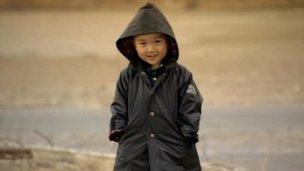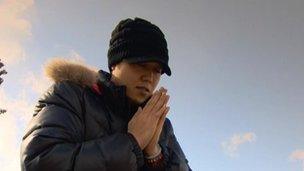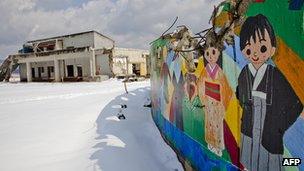Grief of Japan's tsunami survivors
- Published
The BBC's Damian Grammaticas returns to Yuriage on Japan's east coast a year after it was devastated by a tsunami that killed thousands.
A few hundred yards from the seashore, on top of a small mound of earth, Japanese flags flutter in the brisk, chill breeze. There is a giant fir tree that is twisted and mangled but still alive, an ancient standing stone and some wooden stakes inscribed with prayers.
They are the ruins of a centuries-old temple that used to stand here, guarding the fishing port of Yuriage, in Natori on Japan's east coast. Yuriage was once home to 7,000 people. But all around it now there is emptiness.
On the ground are lines, like scars, the grid pattern where Yuriage's streets and homes stood. Everything has gone. Yuriage was washed away by the tsunami. A year on, all the rubble has been cleared and little remains except tufts of grass sprouting everywhere.
In the distance are the ruins of the few structures that withstood the waves. A couple of schools, an office block, a civic hall. One by one, the buildings are all being demolished.
A constant flow of cars and buses pulls up by the ruined temple. People climb the mound to the shrine in quiet groups and say silent prayers for Yuriage's victims.

Hibiki Suzuki and his sister Hikari have started a new school near their grandparents' house
Just below the temple is where Tatsuya Suzuki's home used to be. His two children, Hikari, seven, and her small brother Hibiki, three, sit on a rock, wrapped up against the cold.
Tatsuya has brought them back to see where their house stood. "This was your room," he says, pointing to a bare patch of ground, "And this is where your grandmother had her cafe," pointing to another empty patch.
"Even though one year has passed, nothing has really changed," Mr Suzuki explains. "Time has stopped for me. Time has passed for everyone and everything else, but not me. For others, the disaster may be becoming a thing of the past, but for us, it is still our reality today. I think we are all still grieving."
'Survivor's guilt'

Mr Suzuki regrets not taking a day off on the day the tsunami hit Yuriage village
Most of all, he feels a deep and shameful sense of guilt. Mr Suzuki, a printer, had gone to work the day of the tsunami, leaving his wife Izumi and the children at home.
When the tsunami alert sounded he tried to get back to Yuriage to fetch his family. But as the wave came in, Mr Suzuki was forced to turn back. Izumi, meanwhile, managed to get the children to safety. Seconds later, she was swept away by the waves.
"That day was the day of my children's graduation. I didn't take a day off because I was busy and went to work instead," says Mr Suzuki. "It's something I regret every day. If had taken the day off and been here with them, my wife could have been saved."
"Every time I think about it, I wish I could go back in time, go back to that day and save my wife," Mr Suzuki adds. "I wouldn't mind if everything else had been swept away, if only I could have saved my wife."
Having lost his house, Tatsuya is now living in his parents home about 20 minutes away from Yuriage. His children have started at new schools, but there is little space at his parents' place for all the family, his printing business is struggling, and he says he has had little help from the government.
"To be frank, the government has not done much for us. We got more from volunteer organisations like Red Cross than from the government," he says.
"When help is given, it only goes to those living in the temporary shelters. People like us who are staying with families or in rented places do not get much. I do wonder why we are discriminated against when we are all victims. It can be irritating."
A few hundred yards away from where his home stood, there is now an improvised cemetery, with lines of new tombstones in black and grey marble. We now know that 1,000 of Yuriage's people died. And along this coastline, where for hundreds of miles towns were devastated, the toll of dead is now well over 15,000, with another 3,200 still missing.
So it is not only Mr Suzuki's life that has stood still, those who have not been able to find any trace of their relatives since the disaster are also caught in a terrible, paralysing limbo.
Ongoing search

A mural has been erected to remember the children who died at school in Okawa
A couple of hours up the coast from Yuriage, on a little inlet, stood the pretty village of Okawa. Now, there is just a muddy plain here, and another little shrine. It has been set up in front of the gutted remains of Okawa's school.
The shrine has flowers, some toys, a baseball, candles and a bell that people come to ring. Of 100 children at the school, 70 were swept away to their deaths, four are still missing.
Right next to the school, by the seashore, are teams of policemen in blue uniforms with mechanical diggers and hand shovels. One year on, they are still working through the piles of mud left by the tsunami, still searching for bodies.
A woman is standing, watching patiently, eyes fixed on every shovel full of earth that is turned. Her daughter is one of the children still unaccounted for.
Yasukichi Takeyama is watching too, a rake in hand. In his 50s, he is still searching for his mother, Towako, who was with the school children when the wave hit. Every time a digger scoops up some mud, he sifts through it. But all the teams turn up are a few old shoes, some blankets, and a child's toy car.
"Nothing moves on," says Mr Takeyama. "I want to find my mother. But there has been no sign of her. I have been following police search teams like this all year. I wanted to find at least a piece of her bones before a year had passed, but I have no idea what happened and I cannot find any trace of her."
Now he worries that the whole community of Okawa, deprived of its children, will die too. "No children mean no future generation," he says.
"Unless they reconstruct this area quickly, no one will come back. They have to make it habitable again so that people will return. Otherwise, they will just go and move away."
In Yuriage, they are planning to rebuild. They are talking of raising the level of the ground by three metres and reconstructing their town in the same place by the sea.
Coming home
Mr Suzuki gazes out at the empty space where his home was. "Even though there is nothing here, I feel at home, right here," he says. "We have lost everything in the tsunami, but this is where I was born and grew up. So one day, I would like to return."
Miyagi prefecture debris chief Sasade Haruyasu shows his '100 years of waste'
"But my children don't want to come back. So I don't think it will be possible until they are grown up, married maybe. Then, when I end up on my own, I could return and live here again."
His children, Hikari and Hibiki, smile and laugh as they play. "They are laughing like this every day, but I think they have a sense of sadness, loneliness deep down," says Mr Suzuki.
"They don't say 'Mama, mama' too much now, but sometimes they cry out suddenly in their sleep. On birthdays, anniversaries, the things we used to do as a family, that's when we all miss their mother.
"From time to time, I see sadness in their faces. When I see that, I struggle to know what to say to them, my heart aches."
"My wife was very good at bringing up the kids. I am no good at it. Both my kids were inseparable from their mother before the disaster. The kids have gotten used to me a bit, but there are a lot of things only a mother can do for her children."